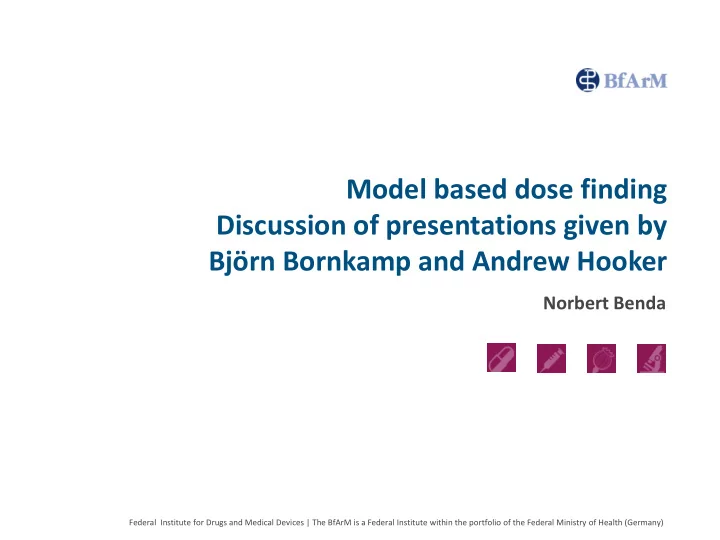

Model based dose finding Discussion of presentations given by Björn Bornkamp and Andrew Hooker Norbert Benda Federal Institute for Drugs and Medical Devices | The BfArM is a Federal Institute within the portfolio of the Federal Ministry of Health (Germany)
Key features to discuss • Study goal dose response and target dose estimation • • Model based dose response estimation regression and model selection • Validity • bias and coverage probability • Robustness • model uncertainty • • Efficiency optimal design • • Exploration vs confirmatory confirmatory evidence ? • Federal Institute for Drugs and Medical Devices | The BfArM is a Federal Institute within the portfolio of the Federal Ministry of Health (Germany) 2
Study goal (1) • Dose response on its own positive dose response signal • exploring potential dose adjustments • • Target dose estimation e.g.minimum effective dose • • Select a dose to put forward in Phase III optimal expected risk benefit • dose response models for efficacy and safety • development efficiency • Federal Institute for Drugs and Medical Devices | The BfArM is a Federal Institute within the portfolio of the Federal Ministry of Health (Germany) 3
Study goal (2) • Estimation of dose response relation • target dose • • Proof of concept demonstration of positive dose response signal • • Regression model focussing on interpolation • abandoning pairwise comparison to placebo • dose finding as an estimation exercise • questionable conclusions from significant or insignificant • differences depending on the goal of the study Federal Institute for Drugs and Medical Devices | The BfArM is a Federal Institute within the portfolio of the Federal Ministry of Health (Germany) 4
Model based dose response estimation (1) • Borrowing strength between dosages model to provide link between dose groups • • Model justification heuristic models • different options to choose from • model uncertainty • • Alternatives to discuss, e.g. PK-PD derived models • spline-based procedures • • Differences between different options ? MCPMod, model averaging, spline-based, etc. • compare e.g. distributions of target dose estimates • Federal Institute for Drugs and Medical Devices | The BfArM is a Federal Institute within the portfolio of the Federal Ministry of Health (Germany) 5
Model based dose response estimation (2) • Relevant model features validity of the conclusions • e.g. bias and coverage probability of target dose estimation • robustness against model deviation • • Potential model extension longitudinal data • incorporating covariates • exploring dose adjustments for special populations • multivariate dose response • efficacy and safety • Federal Institute for Drugs and Medical Devices | The BfArM is a Federal Institute within the portfolio of the Federal Ministry of Health (Germany) 6
Efficiency • Optimal design criteria for optimality • e.g. precision of target dose estimation • local optimality only • depends on parameter to be estimated • efficiency of locally optimal design as a benchmark • larger number of dose groups for robustness • • Adaptive design protection against mis-specified design and bad starting values • relative efficiency vs locally optimal design • less efficient than possible in theory • more robust • Federal Institute for Drugs and Medical Devices | The BfArM is a Federal Institute within the portfolio of the Federal Ministry of Health (Germany) 7
Validity of conclusions • Target dose estimation coverage probability and bias • conf. interv. compromised if based on finally selected model • • Account for model selection fully prespecified procedure • use e.g. bootstrap • • Confirmatory conclusions based on model assumptions • in contrast to single comparison of a specific dose vs placebo • power vs. robustness • dose finding study to be used as pivotal evidence • prespecification + type-1 error control of relevant comparisons • Federal Institute for Drugs and Medical Devices | The BfArM is a Federal Institute within the portfolio of the Federal Ministry of Health (Germany) 8
Recommend
More recommend